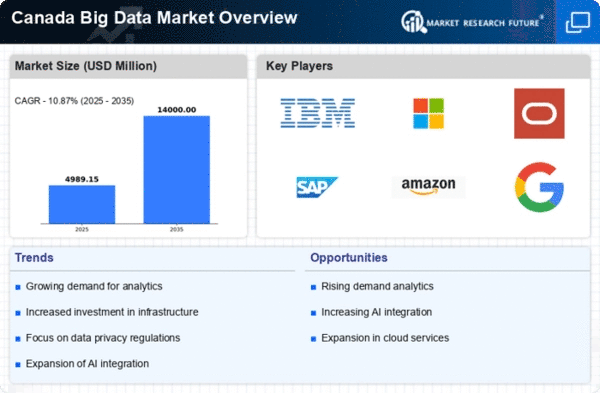The competitive dynamics within the big data market are characterized by rapid technological advancements and an increasing demand for data-driven decision-making across various sectors. Key growth drivers include the proliferation of IoT devices, the rise of AI applications, and the necessity for businesses to harness vast amounts of data for competitive advantage. Major players such as IBM (US), Microsoft (US), and Amazon (US) are strategically positioned to leverage these trends, focusing on innovation, cloud integration, and partnerships to enhance their offerings. Their collective strategies not only shape the competitive environment but also drive the market towards a more integrated and sophisticated data ecosystem.
In terms of business tactics, companies are increasingly localizing their operations to better serve regional markets, optimizing supply chains to enhance efficiency, and investing in advanced analytics capabilities. The market structure appears moderately fragmented, with a mix of established giants and emerging players. This fragmentation allows for diverse competitive strategies, where key players exert considerable influence through their technological advancements and market reach.
In October 2025, IBM (US) announced a significant partnership with a leading Canadian telecommunications provider to enhance its cloud-based analytics services. This collaboration aims to integrate advanced AI capabilities into the telecommunications infrastructure, thereby improving data processing speeds and analytics for end-users. The strategic importance of this partnership lies in IBM's ability to expand its footprint in the Canadian market while simultaneously enhancing service delivery through localized solutions.
In September 2025, Microsoft (US) launched a new initiative focused on sustainability within its Azure cloud platform, emphasizing energy-efficient data centers and carbon-neutral operations. This move not only aligns with global sustainability goals but also positions Microsoft as a leader in environmentally responsible data management. The strategic significance of this initiative is profound, as it caters to the growing demand for sustainable practices among businesses, potentially attracting a new customer base that prioritizes environmental impact.
In August 2025, Amazon (US) unveiled its latest big data analytics tool, designed specifically for small to medium-sized enterprises (SMEs) in Canada. This tool aims to democratize access to advanced analytics, enabling SMEs to leverage data insights without the need for extensive resources. The strategic importance of this launch is evident, as it opens new market segments for Amazon, fostering innovation and competition among smaller players who may now have access to sophisticated analytics capabilities.
As of November 2025, current trends in the big data market are heavily influenced by digitalization, sustainability, and the integration of AI technologies. Strategic alliances are increasingly shaping the competitive landscape, as companies recognize the value of collaboration in enhancing their technological capabilities. Looking ahead, competitive differentiation is likely to evolve from traditional price-based competition towards a focus on innovation, technological advancement, and supply chain reliability. This shift underscores the importance of agility and responsiveness in a rapidly changing market environment.























Leave a Comment